LATINO COMMUNITIES throughout the United States face several challenges, such as soaring unemployment rates, subpar health care and education, high poverty rates, unjust immigration laws, and lack of adequate housing. Faced with these seemingly insurmountable trials, what ethical paradigms can Latinos rely on to transform their reality? In Latina/o Social Ethics: Moving Beyond Eurocentric Moral Thinking, Christian ethicist and prolific author Miguel A. De La Torre argues that Latino communities can’t afford an abstract ethics (e.g., virtue ethics) during these difficult times. In fact, such an approach to ethics is harmful to marginalized communities.
In the book’s first part, De La Torre deconstructs the abstract Eurocentric ethical paradigms and methodologies prominent in our nation’s universities and government. Ethics in the ivory tower emphasizes abstraction over action, what one thinks over what one does. This abstract understanding of ethics is all too common among many academics, policymakers, politicians, and citizens from across the political spectrum, and can lead to hypocrisy. Thus, while the U.S. may be one of the “developed” world’s most religious nations, our actions and policies—excessive waste of resources and our broken immigration system that tears families apart—speak otherwise. We may think we’re moral and ethical by believing in a deity, but we’re behaving unethically as a nation when we blithely disregard the poor, hungry, and sick—who are disproportionately Latino and black.
Read the Full Article
